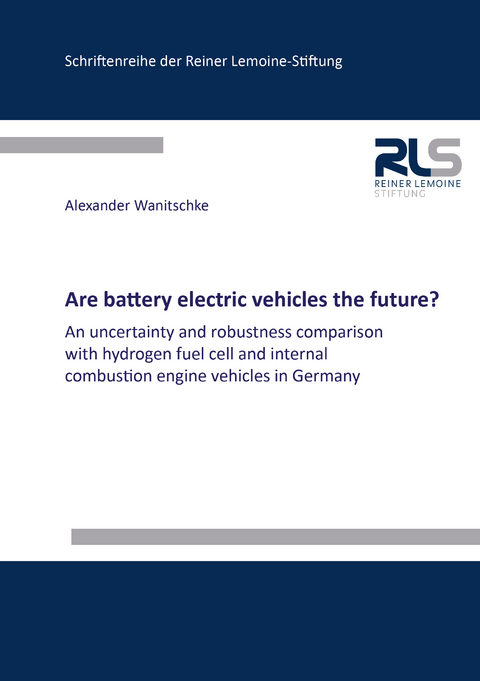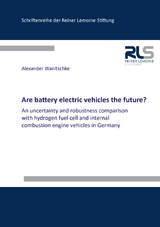Are battery electric vehicles the future?
An uncertainty and robustness comparison with hydrogen fuel cell and internal combustion engine vehicles in Germany
Seiten
The passenger vehicle sector in Germany is under increasing pressure to reduce its greenhouse gas emissions. Three distinct technology options are available as a scalable remedy: (1) internal combustion engine vehicles (ICEV) supplied with non-fossil, hydrocarbon fuels, (2) fuel cell electric vehicles (FCEV) supplied with hydrogen, and (3) battery electric vehicles (BEV) supplied with electric energy. Public disagreement about the “best” option persist to this day. While uncertainty (i.e., lack of knowledge) arguably plays a major role in this disagreement, past research has touched only superficially on what we do and do not know in order to assess how robust the feasibility of any of the technology options is with regards to possible future states of the world.
In order to address this issue I conducted both a systematic uncertainty analysis and a consecutive robustness analysis. The results show that even though all three drive technology options are affected by a similar number and quality of uncertainties, the uncertainty landscape translates into significant differences of robustness regarding the different vehicle technologies' total cost of ownership (TCO) and life cycle greenhouse gas emissions (LCE). According to a tipping point analysis none of the three technologies can be demonstrated to reliably outperform their competitors in all conceivable future states of the world. Each of the three technologies still has distinct vulnerabilities and associated risks. However, it can be argued that today’s reality is closer to the point of clear superiority for BEV than for FCEV or ICEV. Overall my research contributes further arguments of why BEVs should be considered the most reliable option for decarbonizing passenger vehicles in Germany.
In order to address this issue I conducted both a systematic uncertainty analysis and a consecutive robustness analysis. The results show that even though all three drive technology options are affected by a similar number and quality of uncertainties, the uncertainty landscape translates into significant differences of robustness regarding the different vehicle technologies' total cost of ownership (TCO) and life cycle greenhouse gas emissions (LCE). According to a tipping point analysis none of the three technologies can be demonstrated to reliably outperform their competitors in all conceivable future states of the world. Each of the three technologies still has distinct vulnerabilities and associated risks. However, it can be argued that today’s reality is closer to the point of clear superiority for BEV than for FCEV or ICEV. Overall my research contributes further arguments of why BEVs should be considered the most reliable option for decarbonizing passenger vehicles in Germany.
| Erscheinungsdatum | 08.10.2021 |
|---|---|
| Reihe/Serie | Schriftenreihe der Reiner Lemoine-Stiftung |
| Verlagsort | Düren |
| Sprache | englisch |
| Maße | 148 x 210 mm |
| Gewicht | 246 g |
| Themenwelt | Technik ► Elektrotechnik / Energietechnik |
| Technik ► Fahrzeugbau / Schiffbau | |
| Schlagworte | Elektromobilität • Energiewende im Verkehr • synthetische Kraftstoffe • Verkehrswende • Wasserstoff |
| ISBN-10 | 3-8440-8224-7 / 3844082247 |
| ISBN-13 | 978-3-8440-8224-1 / 9783844082241 |
| Zustand | Neuware |
| Haben Sie eine Frage zum Produkt? |
Mehr entdecken
aus dem Bereich
aus dem Bereich
Technologie – Berechnung – Klimaschutz
Buch | Hardcover (2023)
Hanser (Verlag)
39,99 €




